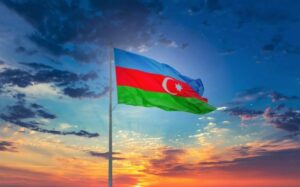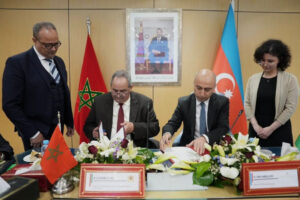Baku Military Court Continues Trial of Former Armenian Officials over War Crimes and Aggression Against Azerbaijan

Baku, The Gulf Observer: The Baku Military Court on Thursday resumed an open court session in the ongoing criminal proceedings against several Armenian nationals, including Arayik Harutyunyan, Arkadi Ghukasyan, Bako Sahakyan, Davit Ishkhanyan, David Babayan, and Levon Mnatsakanyan. The defendants are facing multiple charges of crimes against peace and humanity, including war crimes, genocide, terrorism, and illegal military and political activities stemming from Armenia’s military aggression against Azerbaijan.
The proceedings were presided over by Judge Zeynal Aghayev, with Judges Jamal Ramazanov and Anar Rzayev also present. Alternate judge Gunel Samadova was on standby. The court ensured full legal representation and linguistic interpretation for the accused. Victims, their legal successors, and state prosecutors also attended the session.
At the hearing, Bako Sahakyan, former so-called “head” of the illegal entity established in the formerly occupied Azerbaijani territories between 2007 and 2020, provided testimony in response to questions posed by State Prosecutor Tarana Mammadova.
Sahakyan confirmed that the so-called “defense ministers” of the regime under his leadership included Seyran Ohanyan, Movses Hakobyan, Levon Mnatsakanyan, Karen Abrahamyan, Jalal Harutyunyan, and Mikael Arzumanyan—many of whom also served in official military positions within Armenia. He acknowledged that the “defense minister” and “army commander” roles were merged in the structure of the illegal entity and reiterated that the “leadership” had no authority over the armed forces deployed in the territory.
A 2015 statement by Sahakyan advocating unification with Armenia was presented and confirmed in court. He admitted: “We live with this great desire… when the time comes and the conditions are more favorable, we will implement this other objective as well.”
Addressing the issue of Azerbaijani captives and hostages, Sahakyan claimed that such cases were primarily the responsibility of Armenian military commanders during the early years of the conflict. He also stated that while the illegal regime received weaponry from Armenia, it did not control strategic missile systems such as Iskander-M or Tochka-U, though one S-300 missile system was reportedly deployed in Shusha.
Sahakyan detailed his contacts during the April 2016 clashes with top Armenian military and political figures, including then Defense Minister Seyran Ohanyan and Prime Minister Hovik Abrahamyan. He said the outcome of the clashes was jointly assessed by Armenia and the so-called regime.
Court documents indicated Sahakyan’s involvement in a 2016 Armenian parliamentary commission investigating the April events. He confirmed that the commission lacked authority to compel his participation but stated he provided extensive testimony voluntarily.
The court also reviewed Sahakyan’s 2019 joint visit with Armenian Prime Minister Nikol Pashinyan to military units stationed in then-occupied Azerbaijani territories. Sahakyan justified the visit as a routine inspection by Armenia’s top military official.
Regarding foreign fighters, Sahakyan acknowledged their presence but denied they were mercenaries, stating they arrived from diverse countries, including Middle Eastern states and Canada, through Armenia. He said mine placement operations during his tenure did not require his direct approval and were conducted according to “work plans.”
Sahakyan further commented on the exploitation of natural resources, noting a company registered in Armenia was operating a gold mine in Kalbajar. He also mentioned the establishment of “Karabakh Telecom” with Lebanese investment.
With respect to the 44-day Patriotic War in 2020, Sahakyan stated he was no longer in office but took part in negotiations on cessation of hostilities alongside Arayik Harutyunyan.
Evidence reviewed included records of meetings between Sahakyan and former Armenian presidents, including Robert Kocharyan and Serzh Sargsyan, as well as a 2022 meeting with Ruben Vardanyan and Arkadi Ghukasyan discussing the continuity of the so-called regime and its unification with Armenia.
The next court session is scheduled for June 21.
In total, 15 individuals of Armenian origin stand accused in the case. The charges relate to serious offenses committed during Armenia’s aggressive war against Azerbaijan. These acts, in violation of both domestic and international law, were perpetrated through coordinated efforts by state officials, military leadership, and illegal armed groups operating under the direction and support of high-ranking Armenian figures, including Robert Kocharyan, Serzh Sargsyan, Vazgen Manukyan, Samvel Babayan, and others.
The accused are charged under numerous articles of the Criminal Code of the Republic of Azerbaijan, including but not limited to:
- Article 100 (Aggressive war),
- Article 103 (Genocide),
- Article 105 (Extermination),
- Article 107 (Forced displacement),
- Article 114 (Mercenary service),
- Article 214 (Terrorism),
- Article 218 (Creation of criminal organization),
- Article 278 (Forcible seizure of power),
- Article 279 (Illegal armed groups),
- and Article 277 (Assassination of public figures).
The judicial process continues to serve as a platform for accountability and documentation of crimes committed against the Azerbaijani state and its citizens.


